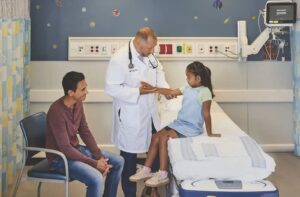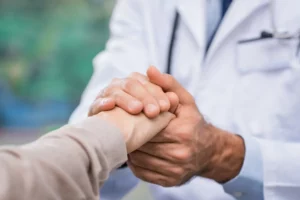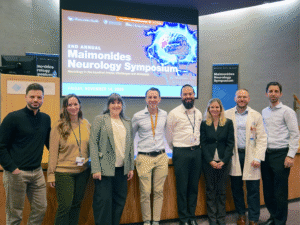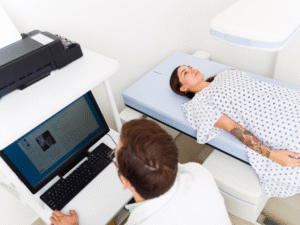Summary
Breast cancer is still all too common but the last few years have brought more targeted therapies and other important advances in treatment. Dr. Joshua Feinberg discusses the latest in breast cancer care and what Maimonides Breast Center has to offer. The Maimonides Breast Center is the only NAPBC program in Brooklyn, which is the highest distinction for clinical excellence and reflects our commitment to patients.
Listen on Spotify Listen on Apple Podcasts Listen on Google Podcasts
Transcript
Amanda Wilde: Breast cancer is still all too common, but the last few years have brought more targeted therapies and other important advances in treatment. We’ll talk about the latest in breast cancer care with Dr. Joshua Feinberg board certified breast surgeon at Maimonides Breast Center. This is Maimo MedTalk. I’m Amanda Wilde, your host Dr. Feinberg. Thank you so much for being here.
Dr. Joshua Feinberg: Yeah, it’s a pleasure. Thank you so much for having me.
Amanda Wilde: Let’s start where most of your patients do, which is I have breast cancer and I don’t know what comes next? How do you deal with that initial meeting?
Dr. Joshua Feinberg: Sure. So in these situations, the most important first step is to make sure that I have all the. Accurate information regarding the patient’s workup thus far. And this takes place even before I meet the patient. So this includes reviewing previous imaging that the patient may have undergone or any biopsy results if they were performed. And the reason this is such a critical step is because in this day and age, there’s so much false information floating around the internet, that is not uncommon for patients to believe they have cancer, when in actuality, they may just have a high risk lesion.
That is not cancer and can be followed with close imaging surveillance. In the cases where the diagnosis is established. I first encourage patients to tell me any information that they’ve been told so far. Sometimes patients know the details of their diagnosis in detail, and have already even prepared a list of questions. Other times, patients really just know that a cancer was diagnosed and that’s the only information they’ve been given. So it’s very helpful to use this information to guide the conversation. I then sit with the patient and use illustrations to explain in the simplest of terms, how a breast cancer develops and the ways in which we treat it.
A diagnosis of breast cancer can make the mind automatically assume the worst. We see that all the time and pictures really can help patients visualize what we’re dealing with. And this knowledge alone often reduces patient anxiety, and sometimes patients even ask to see their own images. And I’m always happy to review these with. These early discussions can understandably be overwhelming. And I always tell patients, I’ll spend as much time as is needed to make sure to address any questions or concerns they have because inevitably questions will arise.
And it’s important to understand the treatment process as best as possible. And my patients know that I’m there for them 110 percent.
Amanda Wilde: How have you seen breast cancer treatment change in the last decade or so?
Dr. Joshua Feinberg: Yeah. In the last decade, we’ve seen a trend towards a deescalation in breast cancer surgery. This is a result of a growing number of trials of breast cancer treatment that demonstrate equivalent survival outcomes when some previously routine therapies such as radiation treatment or axillary lymph node dissection, in which several lymph nodes are removed from the under arm are emitted in select patient groups.
Overall, this is resulted in a more personalized approach to breast cancer treat. Which is really great for patients. It means that we can spare them the undesired side effects of treatments without sacrificing oncologic outcomes. It’s definitely an exciting time to treat breast cancer.
Amanda Wilde: Well, you say a personalized approach. What kind of tools do you have available to address different breast cancers?
Dr. Joshua Feinberg: Sure. Molecular testing has really expanded in the past decade. And what this means are that there are tests that can be run on a patient’s blood sample or from the tumor specimen to tell us which treatments that the patient will respond to or which they really might not benefit from. And that are then not necessary to administer or prescribe. So using that information gained from the molecular testing, we can tailor the treatments according to the patient’s specific diagnosis.
Amanda Wilde: What might some of those treatments be?
Dr. Joshua Feinberg: So mainly we’re talking about chemotherapy and traditionally patients who had a tumor of one centimeter in size or greater all got chemotherapy. And this was up until probably 15 years ago, maybe 10 years ago. And we really now moved away from that approach and using the molecular testing to say that patients who have a high risk lesion as reported by these molecular testing assays, they benefit from chemotherapy.
While patients of the same age with a very similar appearing tumor based on imaging and physical exam. Once we take a closer look on the cellular level, we can say that those patients won’t need chemotherapy and they may just benefit from anti hormonal therapy against estrogen.
Amanda Wilde: Yeah. And I always hear about targeted therapies for certain genetics of breast cancer. And also we’re knowing more and more specific genes that are indicative in breast cancer. Has that more detailed genetic information opened up new treatment options?
Dr. Joshua Feinberg: Yes, absolutely. There really have been amazing strides in our understanding of the human genome as a whole in the past 20 years. And more recently in our understanding of cancer genomics. So one question patients frequently ask is whether there’s a genetic or hereditary cause for their breast cancer. And for patients with a family history, especially when diagnosed at an early age, we’ll frequently refer these patients to a genetic counselor for genetic testing at our breast center.
But the genes tested in the past 10 years have changed dramatically. So even if a patient has previously undergone genetic testing, depending on when the test was performed, We may repeat that testing with newer genetic assays with that said, it’s important to realize that a family history of breast cancer certainly does not mean that a genetic mutation caused a patient to develop their cancer.
However, when we identify a high risk genetic mutation, the most common of which are BRCA, or BRCA genes known more commonly, we can offer these patients closer surveillance protocols with the use of technology such as breast MRI, or even treatments targeted at the responsible gene detected on the testing. Another area of cancer research that we’ve recently begun to understand much better is the micro environment where cancer cells live.
So in other words, there are factors aside from the genes themselves such as changes in our own bodies immune system, which can allow a cancer to form. And as we take advantage of things such as our own immune system and the cells involved. We can use this to develop treatments for our patients and target the specific areas that are leading the cancer to form.
Amanda Wilde: Is this the immunotherapy I hear about using your own body to, and your own defenses to eradicate?
Dr. Joshua Feinberg: Exactly. Immunotherapy is definitely part of this. Exactly. And it really is the idea of using our own body’s immune system, which normally fights away viruses or bacteria or other illnesses, and often believe it or not, our immune system can fight cancer cells and cancer is smart and it tells our immune system to stop working sometimes. But we’re smart too. And so we can use treatments to tell our immune system to not listen to that cancer and go ahead and kill it.
Amanda Wilde: And that’s something amazing that’s been developed just in the last 10 years or so. And speaking of amazing strides in research on breast cancer, how close are we to a cure?
Dr. Joshua Feinberg: So I think it’s only a matter of time before we find a cure for breast cancer. I think it’s out there. You know, over the past 20 years, we’ve seen incredible progress in terms of early detection with screening mammography, better treatments, and much better outcomes in breast cancer treatment. We’re fortunate to live in a country that has invested a ton towards breast cancer research. And this is important because the cure is going to come from our unsung heroes in the laboratory.
It’s gonna come from research into what makes each breast cancer unique, because there really are several different signatures or forms of breast cancer. And as we continue to identify these differences on a cellular and molecular level, we can offer treatments that will cure our patients. So I think we’re close and it’s not just one cure. It’s many, it’s many to address each patient’s unique breast cancer diagnosis.
Amanda Wilde: Really good point. I imagine it’s exciting as a doctor in terms of a medical specialty, because this sounds like it’s because it’s always evolving.
Dr. Joshua Feinberg: Absolutely. It really is an exciting time to be a breast cancer surgeon.
Amanda Wilde: What got you into this line of medicine?
Dr. Joshua Feinberg: So once I decided in medical school, that surgery was for me. I kept an open mind regarding the pursuit of any subspecialty. And then as a fourth year medical student, I did a sub internship on the breast surgical oncology service. And I was immediately drawn to the field. I was always intrigued by the science and research behind cancer. And in this field, in addition to the technical performance of operations, I saw that you needed to have a complete understanding of all facets of breast cancer and its management. So this includes genetics, medical oncology, radiation oncology.
And it’s a complex and rapidly changing field that I wanted to be a part of. I also had great mentors as a trainee who I’m happy to say are now my colleagues. And I identified with the ability to develop longstanding relationships with patients. I felt I could really help. With the emotional challenges that come with a diagnosis of breast cancer. And then later on in training between my second and third year of general surgery residency, I spent a year in England studying evidence-based medicine at Oxford university. And the tools I gained during that year in research methodology really solidified my decision to become a breast cancer.
Amanda Wilde: And you’re now at my Maimonides Breast Center and I’d love to hear what makes my Maimonides special for you as a physician. And then I’m gonna ask you why a breast cancer patient should go to Maimonides over other cancer care centers?
Dr. Joshua Feinberg: At Maimonides Breast center, there is a tremendous collaborative culture that places the patient at the forefront of all medical decisions and this sense of teamwork spans from our world class oncology physicians, all the way to our physician assistants, nurse navigators, imaging technicians, administrative staff. Whatever one’s role at the cancer center may be, he or she knows that they are part of a team with a common goal to provide the best possible care for patients.
Amanda Wilde: That is great information, Dr. Feinberg, thank you for this insight into the dynamic world of breast cancer treatment and for your compassionate and obviously comprehensive approach. Like I said, it’s really reassuring to know there are surgeons like you on the job.
Dr. Joshua Feinberg: Thank you so much. Yeah, it was a pleasure discussing this. And I really just wanna remind patients that the most important thing is early detection. And when we find breast cancer early, there are multitude of options to treat it. And we’re here for you.
Amanda Wilde: You’re not alone. To make an appointment. Call 718-765-2500. For more information, visit maimo.org. This has been Maimo MedTalk. I’m Amanda Wilde. Be well.







